Energy Efficiency
Top Advantages of Heat Pumps in Eco-friendly Homes
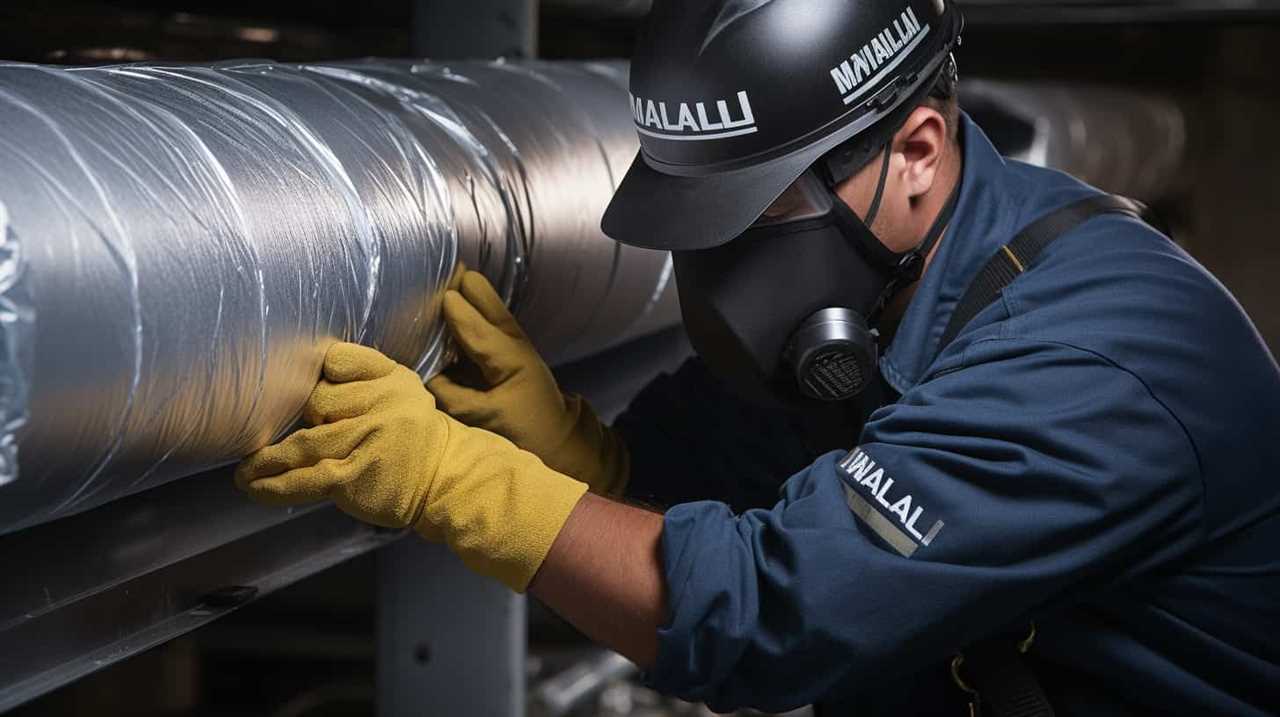
Looking for a way to make your home more eco-friendly? Heat pumps are the answer! They offer a multitude of advantages, from energy efficiency to cost savings and improved indoor air quality.
With their versatility and flexibility, heat pumps are a smart choice for any eco-conscious homeowner. Join us as we explore the top benefits of heat pumps in our quest for a more sustainable and comfortable living environment.
Key Takeaways
- Energy Efficiency and Cost Savings: Heat pumps are highly efficient systems that extract heat from the air or ground, resulting in energy savings. They reduce reliance on fossil fuels, lower carbon emissions, and contribute to a more sustainable future. Homeowners can save up to $700 per year in energy costs compared to other systems, making heat pumps a smart choice for eco-friendly homes.
- Environmental Sustainability: Heat pumps utilize renewable energy sources and produce fewer greenhouse gas emissions compared to traditional systems. Their high energy efficiency leads to significant energy savings, and their longer lifespan reduces the need for replacements, resulting in less waste. Heat pumps promote a greener alternative for heating and cooling, contributing to a more sustainable future.
- Versatility and Flexibility: Heat pumps provide both heating and cooling functions, and they offer smart control features for easy adjustment of settings and energy monitoring. They efficiently maintain comfortable indoor temperatures throughout the year and operate quietly, ensuring a peaceful environment. Heat pumps can be installed in various spaces, making them adaptable to different areas of eco-friendly homes.
- Improved Indoor Air Quality: Heat pumps help purify the air by capturing dust, pollen, and other airborne particles. They reduce the presence of allergens, improve ventilation, and maintain optimal humidity levels, preventing the growth of mold and mildew. Heat pumps contribute to a healthier living environment for eco-friendly homes, benefiting those with allergies and reducing respiratory issues.
Energy Efficiency
When it comes to energy efficiency, heat pumps offer significant advantages for eco-friendly homes. Heat pumps are highly efficient systems that can provide both heating and cooling, making them a versatile choice for homeowners. One of the main benefits of heat pumps is their ability to extract heat from the air or ground, resulting in energy savings compared to traditional heating and cooling systems. By utilizing renewable energy sources such as the air or ground, heat pumps reduce reliance on fossil fuels and contribute to a more sustainable future. This not only helps to reduce carbon emissions but also lowers utility bills.
With their high efficiency and use of renewable energy, heat pumps are an excellent choice for eco-conscious homeowners looking to maximize energy savings.
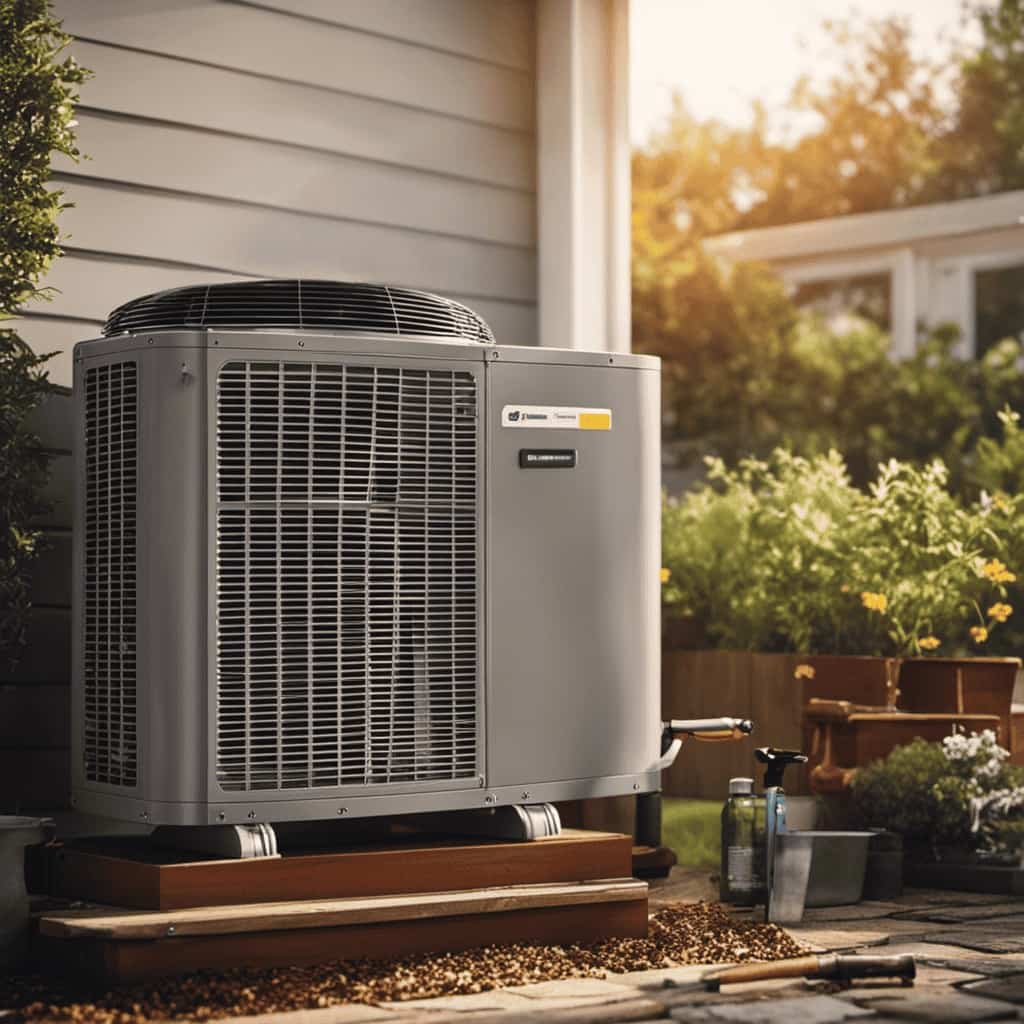
Transitioning into the subsequent section about ‘cost savings’, heat pumps not only provide energy efficiency but also offer significant financial benefits.
Cost Savings
One of the top advantages of heat pumps is that they can lead to significant cost savings for homeowners. By utilizing renewable energy sources, heat pumps are highly efficient in their energy consumption, resulting in lower utility bills. Additionally, heat pumps are a long-term investment, as they have a longer lifespan compared to traditional heating and cooling systems. This means that homeowners can enjoy the cost savings for many years to come.
To provide a visual representation of the potential cost savings, the table below compares the average annual energy costs of a heat pump with other heating and cooling systems:
| System Type | Average Annual Energy Costs |
|---|---|
| Heat Pump | $800 |
| Furnace and A/C | $1,500 |
| Electric Resistance | $2,000 |
As shown, heat pumps can save homeowners up to $700 per year in energy costs compared to other systems. This significant cost reduction makes heat pumps a smart choice for eco-friendly homes looking to save money in the long run.
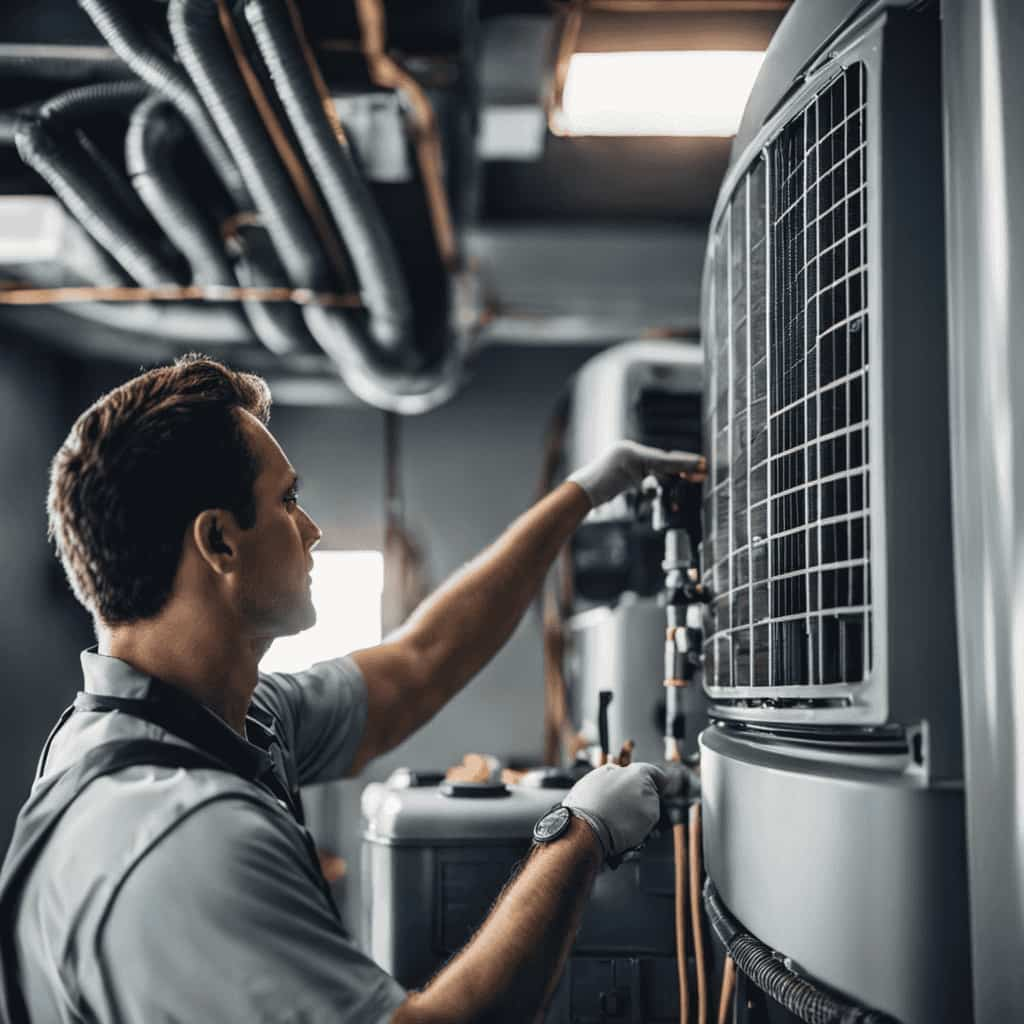
Environmental Sustainability
Our focus is on the environmental sustainability of heat pumps, as they provide a greener alternative for heating and cooling homes. Here are four reasons why heat pumps contribute to a more sustainable future:
-
Renewable Energy Sources: Heat pumps utilize renewable energy sources, such as air, water, and geothermal heat, to provide heating and cooling. By relying on these sources, heat pumps reduce our dependence on fossil fuels and contribute to a more sustainable energy system.
-
Reducing Carbon Footprint: Heat pumps produce fewer greenhouse gas emissions compared to traditional heating and cooling systems. They operate by transferring heat rather than generating it, resulting in lower carbon emissions and a reduced impact on climate change.
-
Energy Efficiency: Heat pumps are highly efficient in converting energy into heat or cooling. They can achieve high levels of efficiency, leading to significant energy savings and reduced environmental impact.
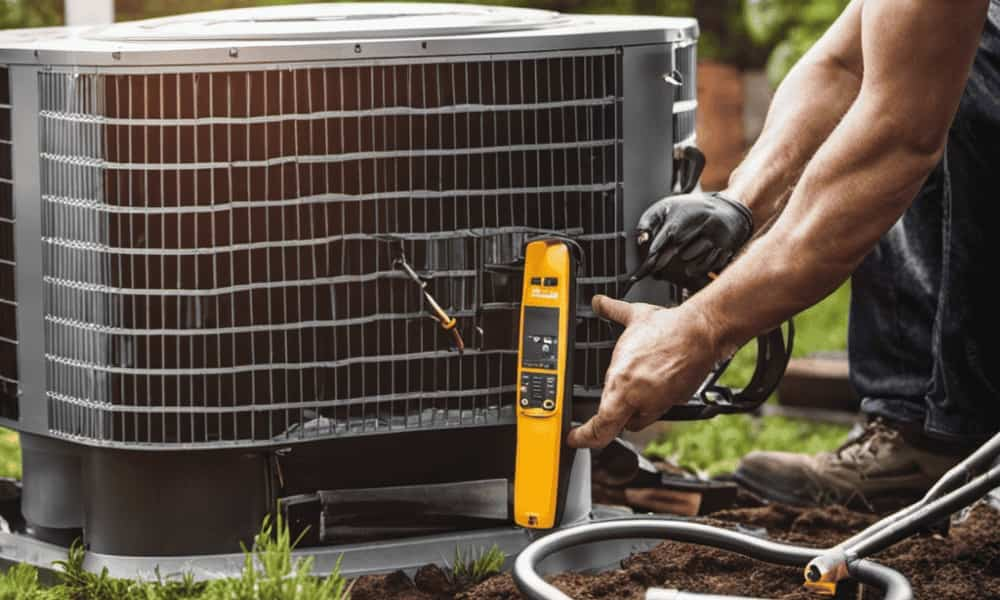
-
Long Lifespan: Heat pumps have a longer lifespan compared to conventional heating and cooling systems. This means fewer resources are needed for replacements, resulting in less waste and a reduced environmental footprint.
Versatility and Flexibility
Heat pumps offer homeowners a wide range of options and adaptability when it comes to heating and cooling their homes. Not only are they capable of providing both heating and cooling functions, but they also offer smart control features that allow users to easily adjust settings and monitor energy consumption. This versatility makes heat pumps a great choice for eco-friendly homes, as they can efficiently maintain comfortable indoor temperatures throughout the year. Additionally, heat pumps are designed to operate quietly, ensuring a peaceful and noise-free environment. This is especially beneficial for those who value tranquility and desire intimacy in their homes. The table below highlights the key advantages of heat pumps in terms of smart control and noise reduction.
| Advantages of Heat Pumps |
|---|
| Smart Control |
| Noise Reduction |
Improved Indoor Air Quality
We can experience improved indoor air quality throughout the year with heat pumps. Heat pumps not only provide efficient heating and cooling but also help purify the air in our homes, resulting in several health benefits.
Here are four ways heat pumps contribute to better indoor air quality:
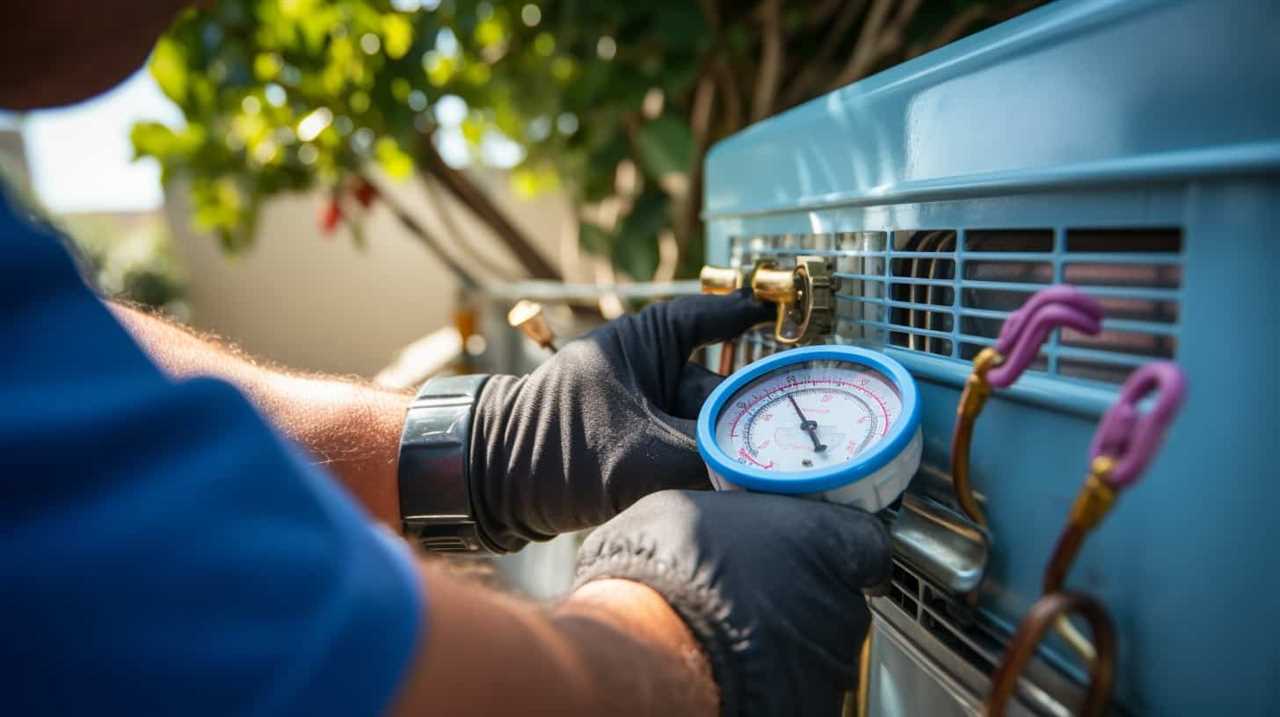
-
Air Filtration: Heat pumps are equipped with filters that capture dust, pollen, and other airborne particles, reducing the presence of allergens in the air we breathe.
-
Humidity Control: Heat pumps help maintain optimal humidity levels, preventing the growth of mold and mildew, which can trigger respiratory issues.
-
Ventilation: Heat pumps promote fresh air circulation by exchanging stale indoor air with filtered outdoor air, improving overall air quality.
-
No Combustion: Unlike traditional heating systems, heat pumps don’t burn fossil fuels, eliminating the release of harmful pollutants into the air.
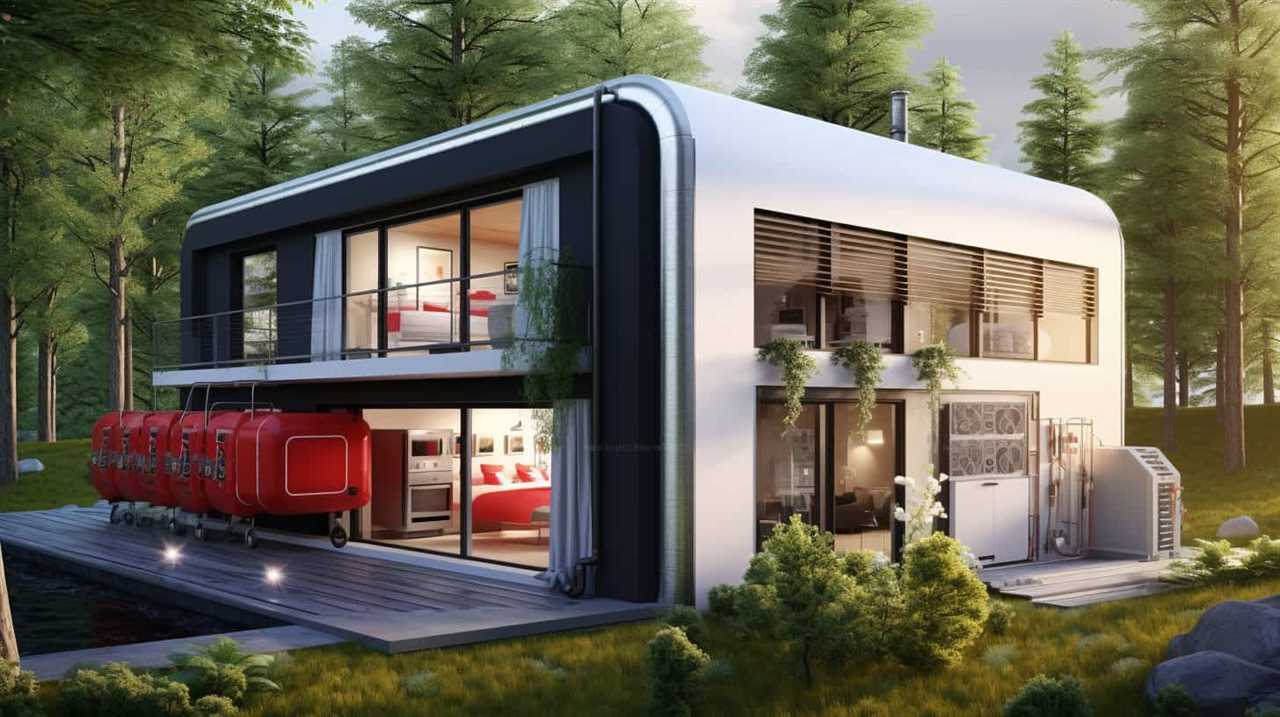
Frequently Asked Questions
Are Heat Pumps Suitable for All Types of Homes, Regardless of Size or Layout?
Heat pumps are a cost-effective solution for all types of homes, regardless of size or layout. They have a significant impact on energy bills, making them an ideal choice for eco-friendly living.
Can Heat Pumps Be Used in Conjunction With Other Heating Systems, Such as Boilers or Radiators?
Yes, heat pumps can be used in conjunction with other heating systems like boilers or radiators. By combining these systems, we can maximize efficiency and provide optimal heating solutions for different types of homes and layouts.
How Long Does It Typically Take to Recoup the Initial Investment of Installing a Heat Pump in Terms of Energy Savings?
How long does it typically take to recoup the initial investment of installing a heat pump in terms of energy savings? Factors such as climate, insulation, and usage patterns can affect heat pump efficiency and the time it takes to recoup the investment.
Are There Any Government Incentives or Rebates Available for Homeowners Who Choose to Install Heat Pumps?
Yes, there are government incentives and rebates available for homeowners who choose to install heat pumps. These incentives aim to promote energy savings and make eco-friendly home upgrades more affordable.

What Maintenance and Servicing Is Required for Heat Pumps and How Often Should It Be Done?
Heat pump maintenance and servicing are essential for optimal performance. Regular check-ups and cleanings ensure efficiency and prevent breakdowns. Our team recommends scheduling professional servicing twice a year to keep your heat pump running smoothly.
Conclusion
In conclusion, heat pumps offer a multitude of advantages for eco-friendly homes. From their exceptional energy efficiency to the cost savings they provide, these systems are a wise choice for any environmentally conscious homeowner.
With their versatility and flexibility, heat pumps can adapt to various heating and cooling needs, ensuring optimal comfort year-round. Moreover, by improving indoor air quality, these pumps contribute to a healthier living environment.
Embrace the power of heat pumps and join the sustainable revolution.
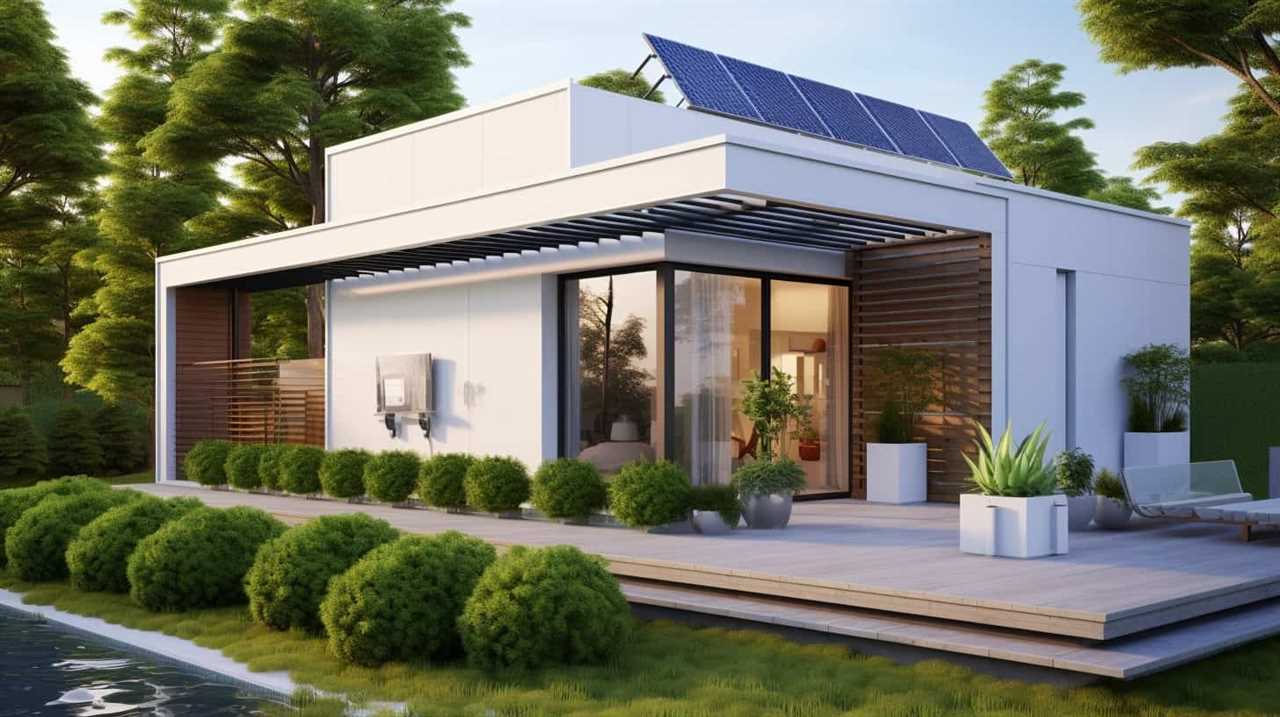
Energy Efficiency
Enchanting Environmental Shifts: Heat Pump Energy Efficiency

We’re about to embark on a journey of enchanting environmental shifts. Get ready to discover the captivating world of heat pump energy efficiency.
In this article, we’ll delve into the fascinating realm of sustainable solutions, exploring how heat pump systems can reduce our carbon footprint and combat climate change.
So, sit back and prepare to be mesmerized by the benefits of these eco-friendly marvels.
Let’s explore the enchantment of heat pump energy efficiency together.

Key Takeaways
- Heat pumps are more energy-efficient than traditional heating and cooling methods.
- Utilizing renewable energy sources such as geothermal or air-source heat pumps minimizes environmental impact.
- Transitioning to heat pump energy efficiency benefits both the environment and homeowners.
- Heat pumps significantly reduce greenhouse gas emissions.
Environmental Impact of Heat Pump Systems
We need to consider the environmental impact of heat pump systems. When evaluating the efficiency of these systems, it’s important to compare their energy consumption with traditional heating and cooling methods.
Heat pumps have proven to be more energy-efficient, resulting in lower greenhouse gas emissions and reduced dependence on fossil fuels. This is especially significant in light of environmental regulations aimed at curbing carbon emissions and promoting sustainable practices.
By utilizing renewable energy sources such as geothermal or air-source heat pumps, we can further minimize the environmental impact of heating and cooling our homes. These systems not only provide cost-effective solutions but also contribute to a greener and more sustainable future.
It’s clear that heat pump systems play a crucial role in reducing our carbon footprint and meeting environmental targets.

Energy Efficiency and Climate Change
Our focus on energy efficiency is crucial in mitigating the impacts of climate change. By improving energy efficiency, we can reduce greenhouse gas emissions and decrease our reliance on fossil fuels. This not only helps to combat climate change but also has numerous policy implications and technological advancements. To better understand the significance of energy efficiency in addressing climate change, let’s take a look at the following table:
| Policy Implications | Technological Advancements |
|---|---|
| Carbon pricing | Smart grid technology |
| Energy efficiency standards | Advanced insulation materials |
| Renewable energy subsidies | High-efficiency appliances |
These policy implications and technological advancements play a pivotal role in promoting energy efficiency and reducing carbon emissions. As we move forward, it is important to explore sustainable solutions for heat pump energy use, which will be discussed in the subsequent section.
[Transition Sentence]: Now, let’s delve into sustainable solutions for heat pump energy use.
Sustainable Solutions for Heat Pump Energy Use
Let’s explore sustainable solutions for improving heat pump energy efficiency. One of the key ways to achieve this is through the use of sustainable technology and renewable energy sources. By incorporating these elements into the design and operation of heat pump systems, we can significantly reduce their environmental impact and increase their overall efficiency.
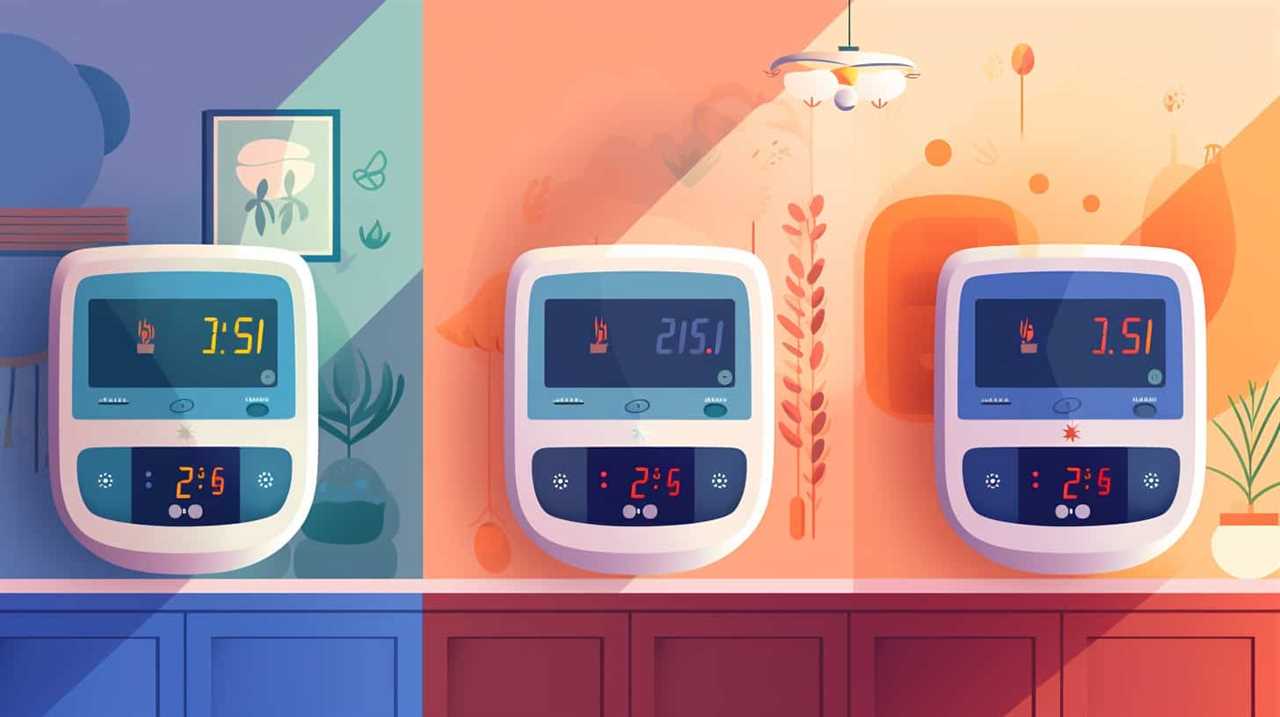
Sustainable technology, such as solar panels and geothermal systems, can provide the necessary energy to power heat pumps. These renewable energy sources have a lower carbon footprint compared to traditional fossil fuels, making them a more environmentally friendly choice.
Additionally, optimizing the design of heat pump systems can further enhance their energy efficiency. This can include using insulation to minimize heat loss, properly sizing the equipment to match the heating or cooling load, and utilizing advanced control systems to optimize performance.
Benefits of Heat Pump Systems for the Environment
Using heat pump systems can provide significant benefits to the environment by reducing greenhouse gas emissions and promoting energy efficiency.
Heat pumps utilize renewable energy sources, such as the heat present in the air, ground, or water, to generate heat or cool spaces. By relying on these renewable sources instead of traditional fossil fuels, heat pumps contribute to a greener and more sustainable future.
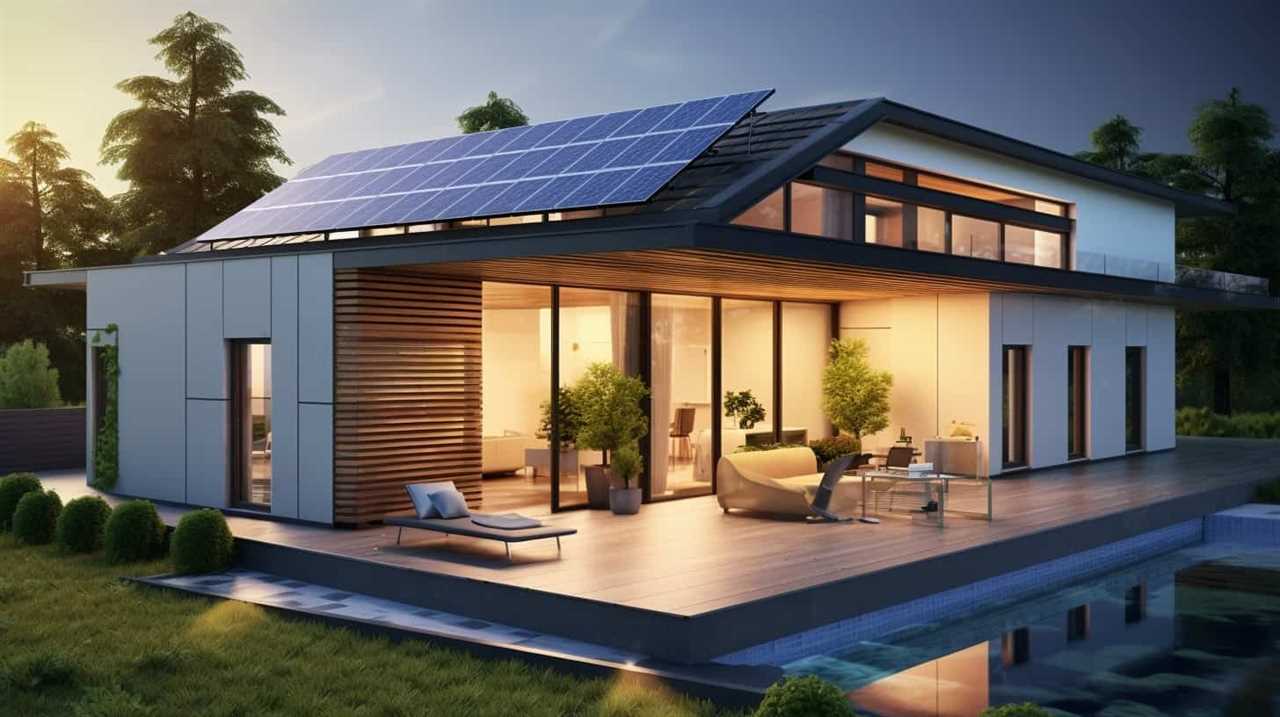
Additionally, heat pump systems offer cost savings for homeowners, as they’re highly efficient in converting energy into heat or cool air. This not only reduces energy consumption but also lowers utility bills.
The combination of reduced greenhouse gas emissions and cost savings makes heat pump systems a win-win solution for both the environment and homeowners. Transitioning to heat pump energy efficiency is a crucial step in reducing our carbon footprint and creating a more sustainable planet.
Reducing Carbon Footprint With Heat Pump Energy Efficiency
Transitioning to heat pump energy efficiency can help us reduce our carbon footprint and contribute to a more sustainable future. By utilizing carbon neutral technology and renewable energy sources, heat pumps offer an environmentally friendly solution for heating and cooling our homes.
Here are some key ways in which heat pump energy efficiency can help us reduce our carbon footprint:

-
Lower electricity consumption: Heat pumps require less electricity to operate compared to traditional heating and cooling systems, resulting in reduced carbon emissions.
-
Utilizing renewable energy sources: Heat pumps can be powered by renewable energy sources such as solar or wind power, further reducing our reliance on fossil fuels.
-
Energy efficient operation: Heat pumps are designed to transfer heat rather than generate it, resulting in higher energy efficiency and lower carbon emissions.
-
Reduced greenhouse gas emissions: By using heat pumps, we can significantly reduce our greenhouse gas emissions, contributing to a cleaner and healthier environment.

-
Long-term sustainability: Heat pump energy efficiency offers a long-term solution to reducing our carbon footprint, ensuring a sustainable future for generations to come.
Frequently Asked Questions
How Does the Installation of a Heat Pump System Affect the Air Quality in a Home?
Installing a heat pump system positively affects indoor air quality by filtering and purifying the air, reducing allergens and pollutants. This improves respiratory health and overall well-being, creating a healthier and more comfortable environment.
Are Heat Pump Systems Suitable for Use in Cold Climates?
Heat pump systems are suitable for use in cold climates due to their high efficiency and performance. They can effectively transfer heat from the outdoor air to warm the indoors, providing comfort and energy savings.
What Are the Potential Drawbacks or Limitations of Heat Pump Systems in Terms of Environmental Impact?
Drawbacks and limitations of heat pump systems in terms of environmental impact include potential refrigerant leaks, reliance on electricity, and the need for proper insulation. However, these can be mitigated with regular maintenance and improved technology.

Can Heat Pump Systems Be Integrated With Renewable Energy Sources Such as Solar Panels?
Yes, heat pump systems can be integrated with renewable energy sources like solar panels. This integration allows for increased energy efficiency and cost savings. Heat pump system integration with wind turbines can also be considered for further environmental benefits.
Are There Any Government Incentives or Programs Available to Encourage the Adoption of Heat Pump Systems for Energy Efficiency?
There are various government incentives and financial programs available to encourage the adoption of heat pump systems for energy efficiency. These initiatives aim to make the transition more affordable and accessible for homeowners and businesses alike.
Conclusion
In conclusion, the remarkable energy efficiency of heat pump systems offers an enchanting solution to mitigate the environmental impact of conventional heating and cooling methods.
By harnessing renewable energy sources, such as the heat from the air or ground, heat pumps provide sustainable solutions that can significantly reduce carbon emissions.

This juxtaposition of environmental benefits and energy efficiency highlights the crucial role heat pumps play in combatting climate change and moving towards a greener future.
Energy Efficiency
Is Your Heat Pump Fighting Global Warming?

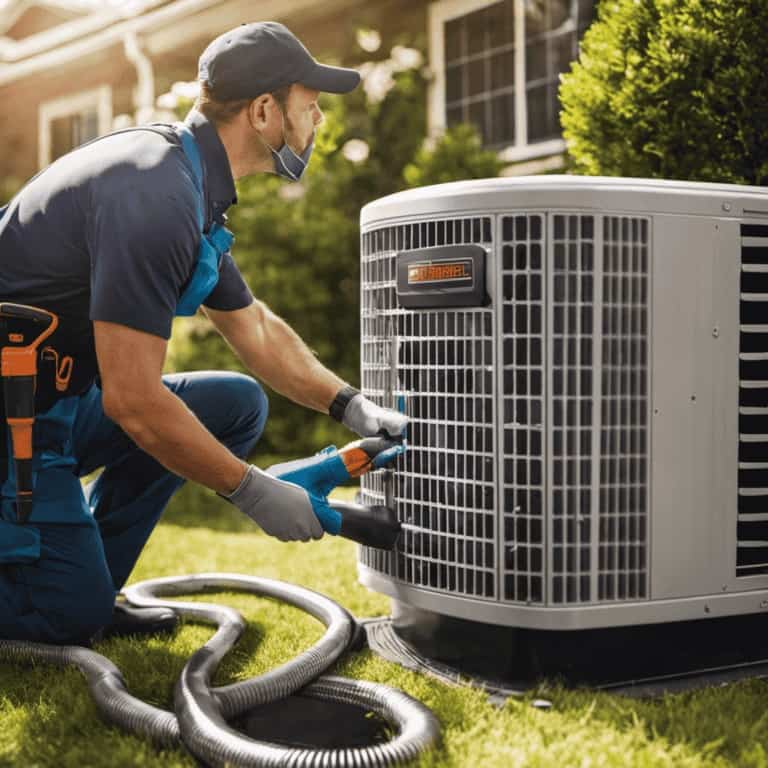
Are your heat pumps helping fight global warming? We examine the importance of energy-efficient heat pumps in lowering carbon emissions and discuss their impact on addressing climate change.
Join us as we delve into the link between heat pump efficiency and global warming, and discover how these innovative technologies hold the key to a sustainable future.
Let’s uncover the truth behind heat pump’s fight against global warming and pave the way for a greener planet.
Key Takeaways
- Heat pumps transfer heat efficiently and consume less energy than traditional systems.
- Homes with energy-efficient heat pumps can reduce carbon emissions by up to 50%.
- Heat pumps serve as a renewable energy source by extracting heat from the air, ground, or water.
- Advancements in heat pump technology focus on improving energy efficiency and increasing the use of renewable energy sources.
The Role of Energy-Efficient Heat Pumps in Reducing Carbon Emissions
Our energy-efficient heat pumps play a crucial role in reducing carbon emissions. As a leading provider of energy saving technology, we understand the importance of minimizing our carbon footprint.
Heat pumps are designed to transfer heat from one location to another, providing both heating and cooling solutions. By utilizing advanced technology, our heat pumps are able to extract heat from the surrounding environment, such as the air or ground, and use it to efficiently heat or cool a space. This process consumes significantly less energy compared to traditional heating and cooling systems, resulting in reduced carbon emissions.
According to data from the U.S. Department of Energy, homes equipped with energy-efficient heat pumps can reduce their carbon emissions by up to 50% compared to conventional systems. By investing in our energy-saving heat pumps, individuals can make a tangible contribution to combating climate change and achieving a more sustainable future.
Understanding the Environmental Benefits of Heat Pump Technology
We can now explore the environmental benefits of heat pump technology, as it offers a more sustainable and energy-efficient solution for heating and cooling. Heat pumps have various applications, including residential, commercial, and industrial settings. By harnessing the natural heat from the air, ground, or water, heat pumps reduce the need for fossil fuel consumption, resulting in lower greenhouse gas emissions. This table summarizes the environmental impact of heat pump technology compared to traditional heating and cooling systems:
| Environmental Impact | Heat Pump Technology | Traditional Systems |
|---|---|---|
| Energy Efficiency | High | Low |
| Carbon Emissions | Low | High |
| Air Pollution | Minimal | Significant |
| Renewable Energy | Compatible | Incompatible |
| Resource Depletion | Low | High |
Understanding the positive environmental benefits of heat pump technology is essential as we transition towards a more sustainable future. By reducing carbon emissions and air pollution while utilizing renewable energy sources, heat pumps play a crucial role in mitigating climate change.

How Heat Pumps Contribute to Mitigating Climate Change
Heat pumps contribute to mitigating climate change by reducing greenhouse gas emissions and increasing energy efficiency. They serve as a renewable energy source that can replace traditional heating and cooling systems powered by fossil fuels. By extracting heat from the air, ground, or water, heat pumps can provide efficient heating and cooling for homes and buildings. This reduces the reliance on carbon-intensive energy sources and helps to transition to a low carbon economy.
According to research, heat pumps can significantly reduce carbon dioxide emissions compared to conventional heating methods. In fact, a study by the International Energy Agency found that by 2050, heat pumps could reduce global CO2 emissions by up to 8 gigatonnes per year. This makes heat pumps a vital technology in the fight against climate change.
Exploring the Link Between Heat Pump Efficiency and Global Warming
Heat pump efficiency plays a crucial role in mitigating global warming. The link between heat pump efficiency and global warming is complex and multifaceted. Here are three important factors to consider:
-
Energy consumption: Heat pumps with higher efficiency ratings require less energy to operate, resulting in reduced greenhouse gas emissions.

-
Renewable energy integration: Efficient heat pumps can be paired with renewable energy sources such as solar or wind power, further reducing carbon emissions.
-
Lifecycle emissions: Heat pump efficiency not only affects the operational phase but also the manufacturing and disposal stages. Improving efficiency throughout the lifecycle can significantly decrease the environmental impact.
Understanding the impact of heat pump efficiency on global warming is vital for making informed decisions about our heating and cooling systems. Transitioning to more efficient heat pump technologies is a step towards a sustainable future with reduced carbon emissions and a healthier planet.
The Future of Heat Pumps: A Solution for a Sustainable Planet
One key aspect of the future of heat pumps is their potential to significantly reduce carbon emissions and promote a sustainable planet. As we look ahead, it’s clear that future innovations in heat pump technology will play a crucial role in achieving our sustainability goals.

These advancements are focused on improving energy efficiency, increasing the use of renewable energy sources, and integrating heat pumps into existing infrastructure seamlessly. By harnessing the power of renewable energy, such as solar or geothermal, heat pumps can operate with minimal environmental impact.
Additionally, the integration of heat pumps with renewable energy sources allows for greater flexibility in energy management and reduces our reliance on fossil fuels. With ongoing research and development, the future of heat pumps holds great promise for a more sustainable planet.
Frequently Asked Questions
Are Heat Pumps Only Beneficial for Reducing Carbon Emissions in Certain Climates?
Heat pumps can reduce carbon emissions in certain climates due to their efficiency and cost effectiveness. However, it is important to consider factors such as energy sources and insulation to fully assess their impact on reducing global warming.
Can Heat Pumps Be Used in Commercial Buildings as Well as Residential Homes?
Commercial applications of heat pumps are versatile and can be used in various settings, including commercial buildings. When comparing commercial and residential heat pump use, it is important to consider factors such as size, capacity, and energy efficiency.

How Do Heat Pumps Compare to Other Renewable Energy Sources in Terms of Their Environmental Impact?
When comparing the environmental impact of heat pumps to other renewable energy sources like solar power and wind energy, it is important to analyze the data objectively. Let’s explore how heat pumps measure up.
Are There Any Government Incentives or Programs Available to Encourage the Installation of Heat Pumps?
Government incentives and heat pump installation programs are available to encourage the adoption of this efficient heating and cooling technology. These programs aim to reduce carbon emissions and promote sustainable energy solutions.
What Are the Potential Drawbacks or Limitations of Heat Pump Technology in Terms of Combating Global Warming?
Heat pump technology has limitations in combating global warming. While it is effective in reducing emissions, factors like high upfront costs, reliance on electricity, and limited efficiency in extreme temperatures hinder its overall impact.
Conclusion
In conclusion, heat pumps play a significant role in reducing carbon emissions and mitigating climate change.
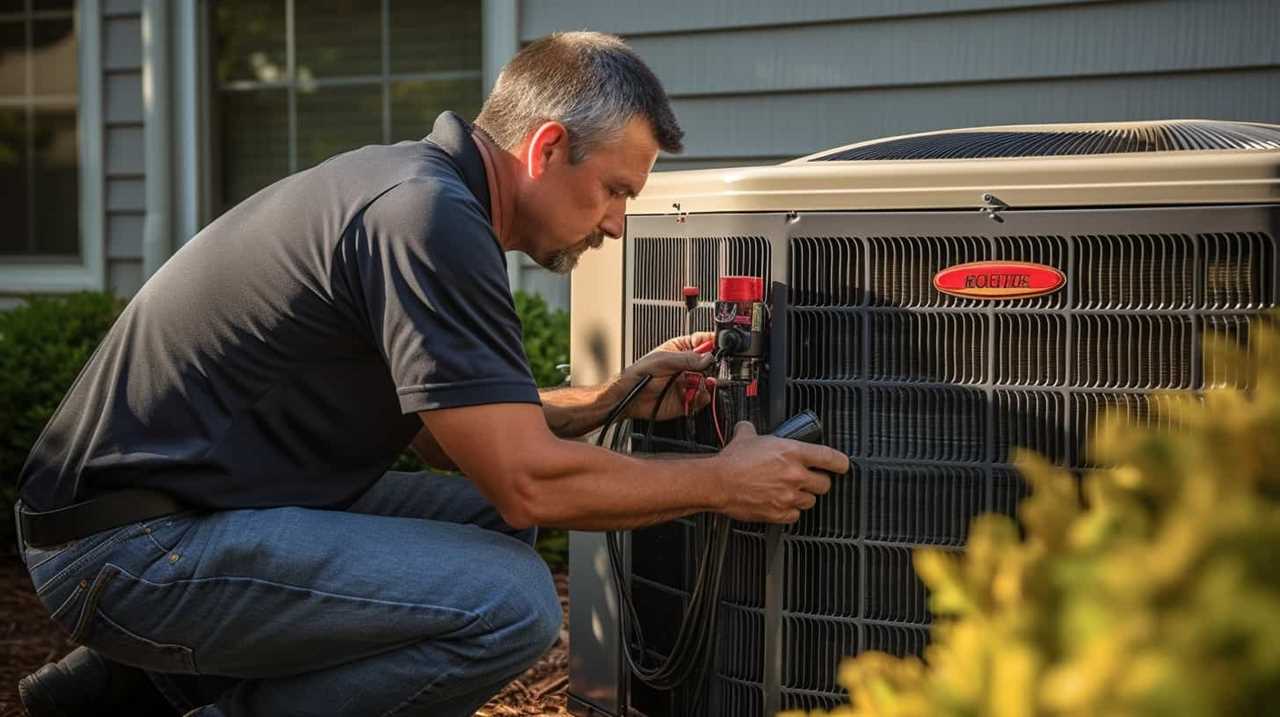
According to a recent study, it was found that using energy-efficient heat pumps can reduce carbon emissions by up to 50% compared to traditional heating systems. This statistic highlights the potential of heat pumps in combating global warming and emphasizes the importance of adopting sustainable technologies for a greener future.
Energy Efficiency
Exploring Heat Pump Technology for Sustainable Heating

Are you looking for a more eco-friendly way to warm up your house? Then look no more!
In this article, we will be exploring the fascinating world of heat pump technology. We’ll delve into the basics, understand the efficiency, and learn about the different types of heat pumps available for sustainable heating.
Join us as we uncover the numerous benefits of heat pump technology and discover what to consider when installing a heat pump system.
Let’s embark on this eco-friendly journey together!

Key Takeaways
- Heat pumps transfer heat from a low-temperature source to a higher-temperature source.
- Geothermal and air source heat pumps are two types of heat pumps commonly used for sustainable heating.
- Heat pumps are efficient, environmentally friendly, and reduce carbon emissions.
- Proper installation, regular maintenance, and consideration of factors like size and operating conditions are important for optimizing heat pump efficiency.
The Basics of Heat Pump Technology
Let’s start with the basics of heat pump technology. Heat pumps are devices that transfer heat from one place to another using a small amount of energy. They work by taking heat from a low-temperature source, such as the air or ground, and then transferring it to a higher-temperature source, such as a building. This process is known as heat pump operation.
Heat pumps have a wide range of applications and can be used for both heating and cooling purposes. In addition to residential heating and cooling, heat pump applications include industrial processes, water heating, and even refrigeration. They’re efficient and environmentally friendly, as they don’t rely on burning fossil fuels to generate heat.
Understanding the basics of heat pump technology is essential for anyone interested in sustainable heating solutions. By harnessing the power of heat transfer, heat pumps offer an efficient and eco-friendly way to keep our homes and buildings comfortable.
Understanding the Efficiency of Heat Pumps
To understand the efficiency of heat pumps, we need to examine their performance in transferring heat effectively while minimizing energy consumption. Heat pump performance is influenced by various factors that affect their efficiency. These factors include the type and size of the heat pump, the quality of the installation, the operating conditions, and the maintenance of the system. By understanding these factors, we can optimize the performance of heat pumps and ensure that they operate at their highest efficiency levels.
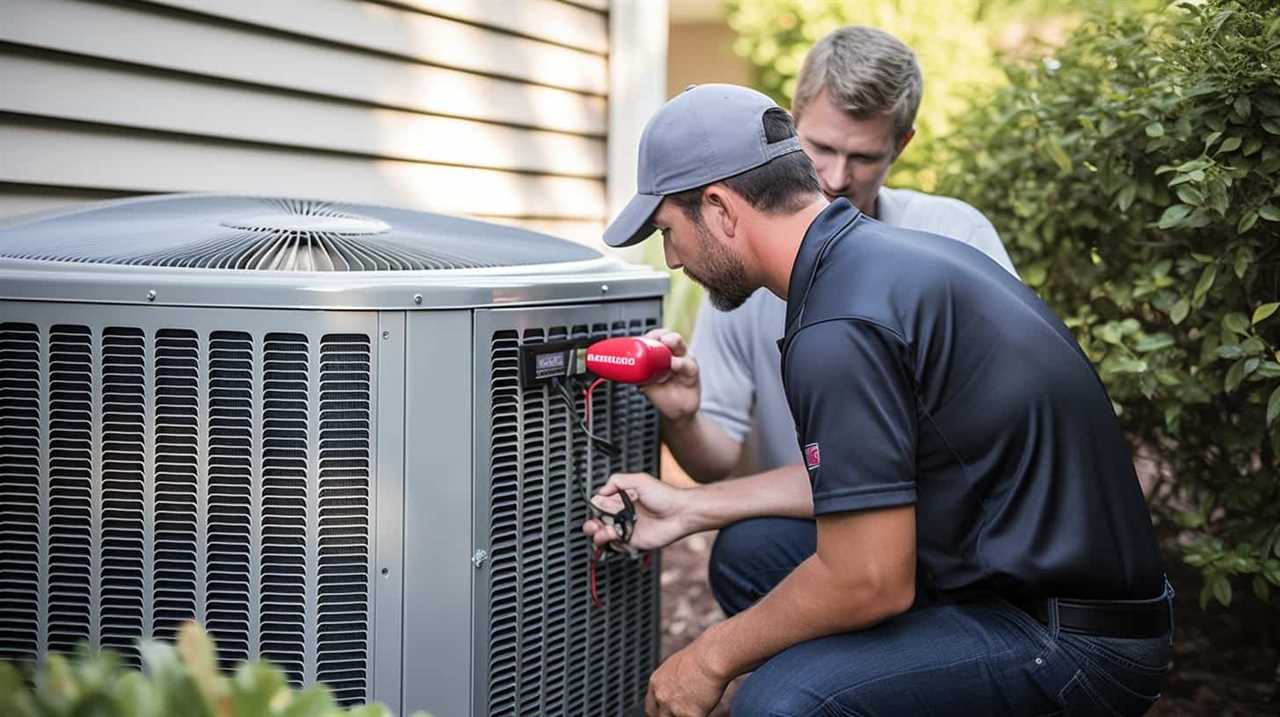
To help illustrate the impact of these factors on heat pump efficiency, let’s take a look at the following table:
| Factors Affecting Efficiency | Impact on Heat Pump Performance |
|---|---|
| Type and size of heat pump | Larger heat pumps may have higher efficiency levels |
| Quality of installation | Proper installation ensures optimal heat transfer |
| Operating conditions | Extreme temperatures can affect efficiency |
| Maintenance of the system | Regular maintenance helps maintain efficiency levels |
Types of Heat Pumps for Sustainable Heating
There are several types of heat pumps available for sustainable heating, each with its own unique features and benefits.
Two commonly used types are geothermal heat pumps and air source heat pumps. Geothermal heat pumps use the constant temperature of the ground as a heat source during winter and a heat sink during summer. They’re highly efficient and can provide heating, cooling, and hot water.
On the other hand, air source heat pumps extract heat from the outside air and transfer it indoors. They’re more affordable and easier to install compared to geothermal heat pumps.
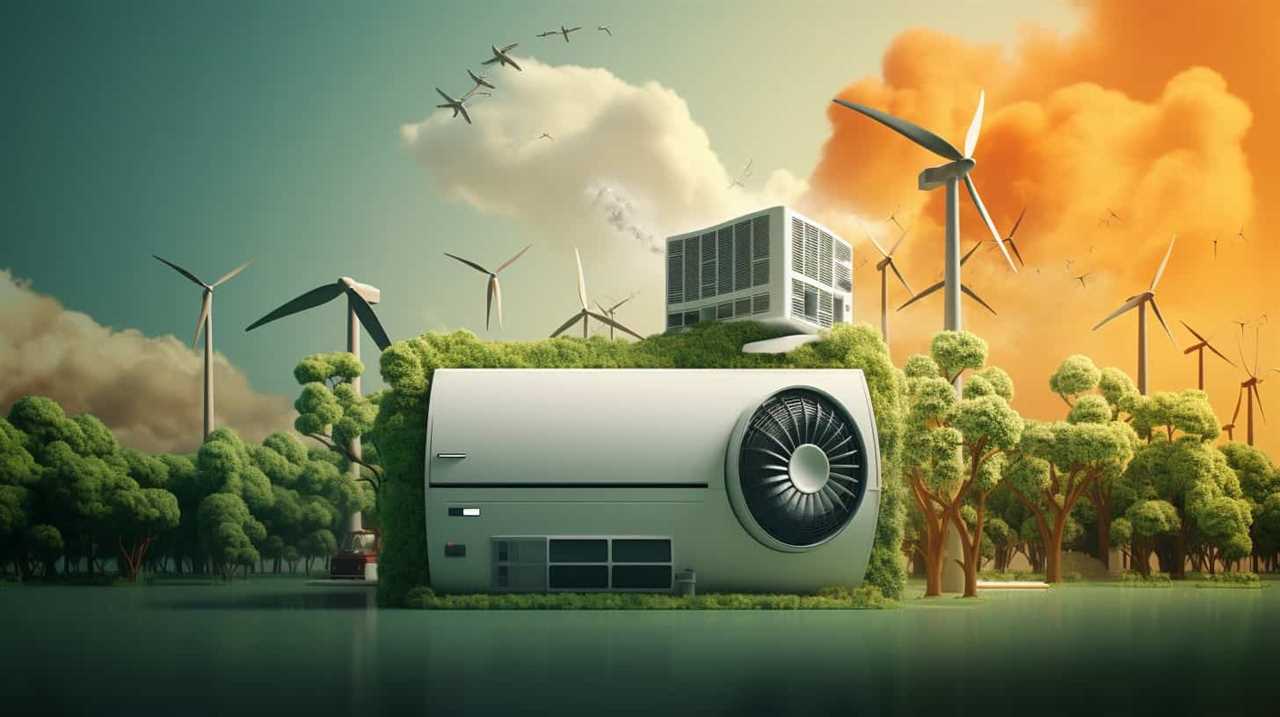
Both types of heat pumps are environmentally friendly alternatives to traditional heating systems, as they use renewable energy sources and reduce carbon emissions.
Choosing the right heat pump depends on factors such as climate, available space, and budget.
Benefits of Heat Pump Technology for Energy Efficiency
We can achieve significant energy savings and reduce our carbon footprint by using heat pump technology. Heat pumps offer several benefits when it comes to energy efficiency, making them a cost-effective and environmentally friendly choice for heating our homes and buildings.
Here are a few advantages of heat pump technology:

-
Lower energy consumption: Heat pumps are highly efficient and can provide the same amount of heat while using less energy compared to traditional heating systems.
-
Reduced utility bills: By using less energy, heat pumps can help lower our monthly utility bills, saving us money in the long run.
-
Minimal environmental impact: Heat pumps produce fewer greenhouse gas emissions compared to fossil fuel-based heating systems, contributing to a cleaner and healthier environment.
Considering these benefits, it becomes evident that installing a heat pump system is a wise choice for those seeking energy efficiency and sustainability.
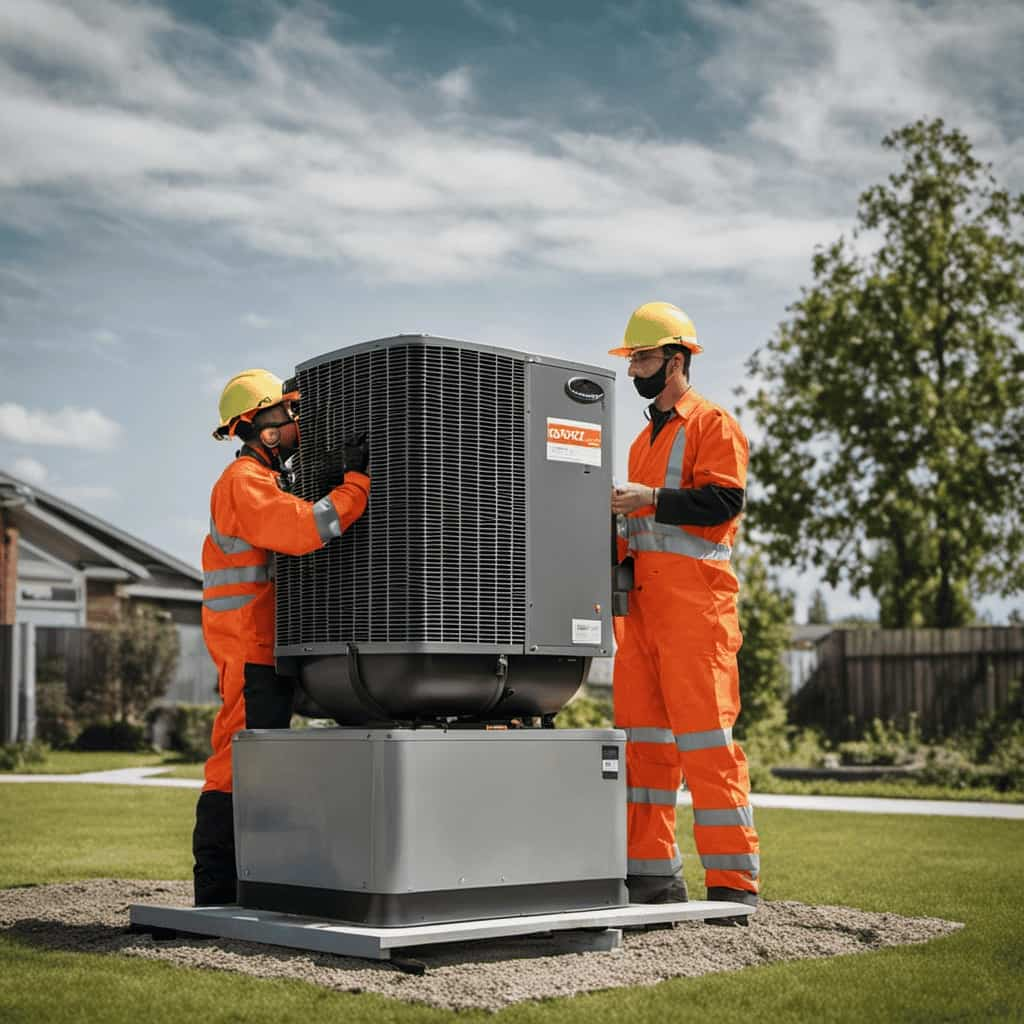
Now, let’s explore some important considerations for installing a heat pump system.
Considerations for Installing a Heat Pump System
Before proceeding with the installation of a heat pump system, it is essential to consider various factors to ensure its optimal performance and efficiency. One of the most crucial aspects is the installation process itself. It is recommended to hire a professional installer who is experienced in heat pump systems to ensure proper installation and avoid any potential issues. Additionally, a cost analysis should be conducted to determine the financial feasibility of installing a heat pump system. This analysis should include the initial cost of the system, any necessary modifications to the existing heating system, and the potential energy savings over time. By considering these factors, individuals can make informed decisions about installing a heat pump system that will serve them efficiently and effectively.
| Factors to Consider |
|---|
| Professional Installation |
| Cost Analysis |
| Energy Efficiency |
Frequently Asked Questions
What Are the Maintenance Requirements for a Heat Pump System?
Heat pump maintenance is important for optimal system performance. Regular inspections, cleaning, and filter replacement are necessary. Troubleshooting issues like insufficient heating or cooling should be addressed promptly to ensure comfort and efficiency.
Can a Heat Pump Be Used for Both Heating and Cooling Purposes?
Yes, a heat pump can be used for both heating and cooling purposes. It’s a versatile solution that provides efficient temperature control and offers the advantage of reducing energy consumption and costs.

How Long Does a Typical Heat Pump System Last?
Typical heat pump systems can last for 15-20 years. Factors like regular maintenance and proper installation affect longevity. Heat pump efficiency can be improved through regular servicing and ensuring a well-designed installation process.
Are Heat Pumps Noisy When in Operation?
Heat pump noise levels can vary, but modern units are designed to operate quietly. Excessive noise can be disruptive in residential areas, so it’s important to choose a model with low decibel ratings to minimize any impact on neighbors.
Are There Any Government Incentives or Rebates Available for Installing a Heat Pump System?
There are government incentives and rebates available for installing a heat pump system. They can help reduce the upfront cost and make it more affordable. This, coupled with energy savings and environmental impact, makes it a cost-effective choice for sustainable heating.
Conclusion
In conclusion, after exploring the basics and efficiency of heat pump technology, as well as the types and benefits of heat pumps for sustainable heating, it’s clear that heat pump technology holds great potential for energy efficiency.
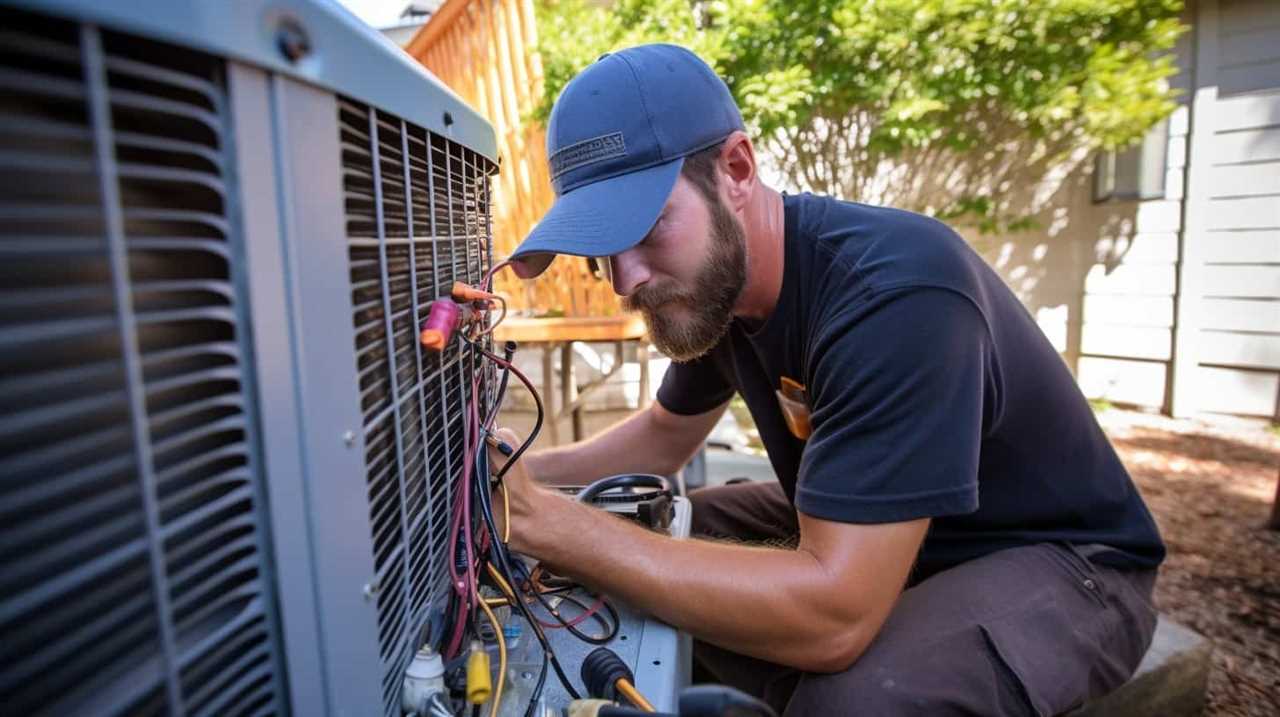
By harnessing renewable energy sources such as air, water, or ground heat, heat pumps provide a sustainable and environmentally friendly heating solution.
As we continue to investigate and improve upon this technology, we can expect even greater advancements in energy efficiency and sustainability.
-

 Residential and Commercial Applications2 days ago
Residential and Commercial Applications2 days agoBest Amana Heat Pump Reviews
-

 Thermal Energy Transfer5 days ago
Thermal Energy Transfer5 days agoBreakthroughs in Modern Heat Pump Systems: Thermal Energy Edition
-

 Residential and Commercial Applications2 days ago
Residential and Commercial Applications2 days agoBest Heat Pump
-

 Geothermal Heat Pumps3 months ago
Geothermal Heat Pumps3 months agoUpgrade Your Comfort with Our Efficient HVAC Systems
-

 Air Conditioning2 months ago
Air Conditioning2 months agoExploring Energy-Efficient Air Conditioning Heat Pumps
-

 Geothermal Heat Pumps3 months ago
Geothermal Heat Pumps3 months agoInnovative Geothermal Heat Pump Manufacturers Revolutionize Energy Efficiency
-

 Thermal Energy Transfer4 weeks ago
Thermal Energy Transfer4 weeks agoBoost Your Heat Pump Efficiency: Interactive Guide
-

 Residential and Commercial Applications2 days ago
Residential and Commercial Applications2 days agoBest Portable Heat Pump Heat & AC










